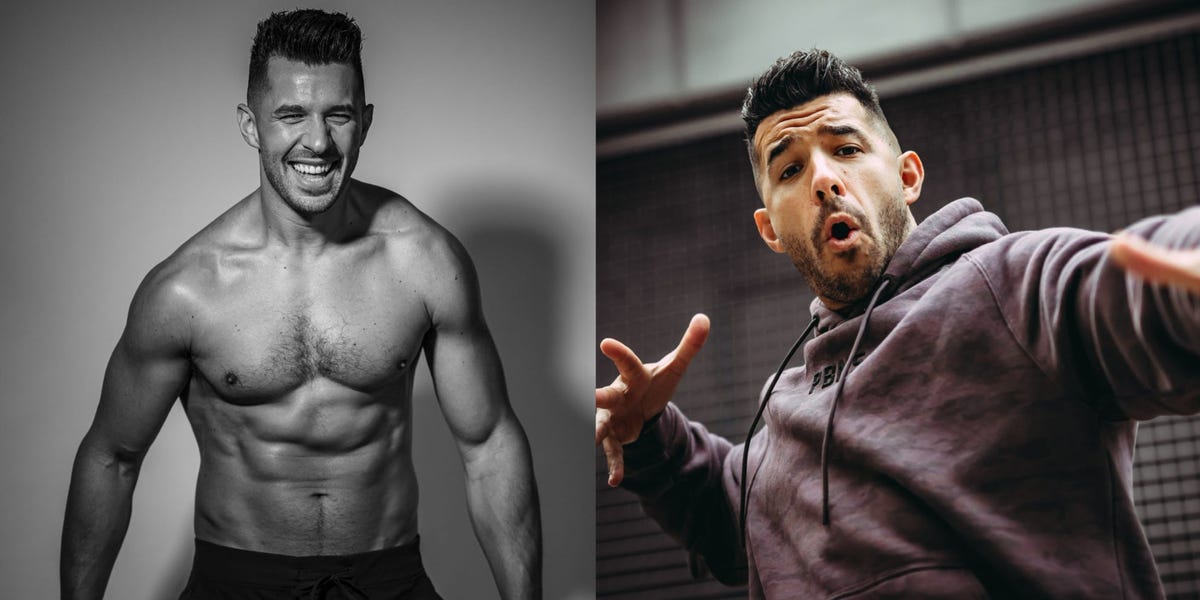- Faisal Abdalla is a Muslim fitness trainer who fasts every year during the holy month of Ramadan.
- He maintains his muscles and fitness by training as normally as possible and eating plenty of protein.
- However, he increases his rest periods to give his body more time to recover.
Fitness trainer Faisal Abdalla told Insider how he maintains strength, muscle and fitness while fasting during Ramadan.
In 2023, Ramadan falls from March 22 to April 21 and sees Muslims around the world fasting from sunrise to sunset. Fasting is one of the five pillars of Islam, with the aim of feeling closer to God while engendering gratitude, self-discipline and self-improvement, according to the Muslim Council of Britain. The dates change every year, which means so does the fasting window – at the end of Ramadan 2023 in London, UK, for example, Muslims will fast from 5:53 a.m. to 8:07 p.m.
During Ramadan, Abdalla, who lives in London, makes sure to eat plenty of protein and increases the rest periods in his workouts, but mostly tries to keep training as normal as possible.
However, Abdalla acknowledges that what works for him may not work for everyone, and he advises people to stick to a small amount of movement, be it a half-hour workout. or a walk, three to five times a week.
“All you need is maintenance,” he said. Taking some time to reset and lighten up your workouts is usually beneficial anyway, allowing you to return to the gym full of enthusiasm afterwards, Abdalla said.
Abdalla gets more rest during Ramadan training
As a personal trainer, Abdalla, 38, is used to training a lot. In an ideal world, during Ramadan he likes to train late in the day so he can eat and refuel soon after. The demands of work and being a father, however, don’t always make that possible, he said.
Faisal with his son.
Faisal Abdalla
In his own training, Abdalla is not pushing for new personal bests, but he is trying to keep going as normal as possible. One concession he makes, however, is longer rest periods to give his body a bit more recovery time.
For example, Abdalla might rest for two minutes instead of one between lifting sets. And if he’s doing a “every minute by the minute” workout, where a certain number of reps of an exercise are repeated every 60 seconds, he’ll decrease the number of reps so he gets more rest time, a he declared.
Abdalla’s job as a group fitness instructor means he is very active, but during Ramadan he tends to push himself a little less when teaching, he said.
However, he finds the limits of what he can do are more in his head than his body, and when he goes his body still works: this Ramadan he matched his previous one-rep-max snatch of 85 kilograms (187 pounds) .
“I’m not losing strength physically, but in my head I feel weak,” Abdalla said.
For him, a big part of Ramadan is the challenge of maintaining his normal lifestyle while fasting.
“I like the challenge, I like when it starts to get difficult,” Abdalla said.
Eating protein is essential for maintaining muscle
Abdalla found that most men he knows worry about losing muscle mass and most women worry about gaining weight during Ramadan.
He usually comes out of Ramadan leaner than when he started because he usually has to eat a lot to sustain his body, and he can’t eat as much in the available window.
Abdalla prefers to sleep in the morning rather than getting up early to eat before dawn, so he eats all his food for the day after sunset and before going to bed around 9:30-10 p.m., he said. .
Abdalla’s wife, Louise, does Ramadan with him and she prepares many dishes – such as chicken curry with rice and peas, breaded chicken and pasta, tajines or pasta Bolognese – at ahead and freeze them so they don’t have to cook for the month.
However, they don’t eat huge portions because the stomach shrinks and it’s important to make it easier for the muscles to open, Abdalla said.
An average food window for Abdalla is:
- beef chili and rice
- Appointment
- peanut butter and banana bagel
- protein pudding
- protein shake made with two scoops of protein powder
By the time Abdalla gets to the shake, he’s uncomfortably bloated but knows it’s important to keep his protein intake high to help retain muscle mass and get more calories into his body.
He also drinks water with electrolytes to stay hydrated too.
Abdalla finds fasting to be “phenomenal” for his body and mind. Not only does he appreciate food more, but he shows himself what he is capable of and loves the challenge of staying positive.

